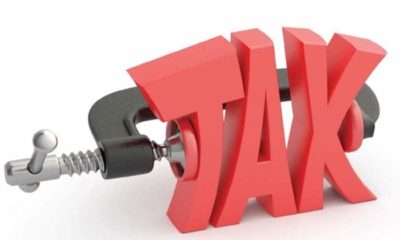- FIRS Sets N8tn Revenue Target in 2019
The Federal Inland Revenue Service has given itself a target to generate N8tn revenue in 2019.
As such, it called on all taxpayers and other stakeholders to support the drive to make the target achievable.
The Chairman, FIRS, Mr Tunde Fowler, disclosed this at the organisation’s 2019 management and stakeholders’ retreat, with the theme: ‘Parliamentary support for effective taxation of the digital economy,’ in Lagos on Monday.
He said the FIRS set the new target after it collected the country’s highest annual revenue of N5.32tn in 2018.
The chairman said, “The parliament is here, the 2019 budget has not yet been approved, but we are here in the corridors of power. The target of the FIRS is in the region of N8tn and with their support and the support of all taxpayers we believe it is achievable.”
Fowler disclosed that prior to 2018, the highest revenue figure ever attained by the FIRS was N5.07tn, which it generated in 2012.
The FIRS’ generation of N5.3tn, he noted, was remarkable, given that it was achieved at a period when oil prices averaged $70 per barrel compared with between 2010 and 2013 when oil price was at an average of $100 to $120 per barrel.
He said the non-oil component of the N5.32tn was N2.467tn (53.62 per cent), while oil contributed N2.852tn (46.38 per cent).
He said the FIRS collected N212.79bn exclusively from audit, a figure that arose from 2,278 cases, and with a huge reduction in audit circle.
Fowler said, “While we have been steadily increasing revenue collection over the years, our cost of collection has actually been going down. In 2016, we collected N3.307tn; in 2017, we collected N4.027tn and in 2018, we collected N5.32tn. “Meanwhile, the cost of collection as a percentage of actual taxes collected has been reducing. In 2016, it was 2.6 per cent. In 2017, it was 2.49 per cent, while in 2018 it was 2.14 per cent.”
He added that the FIRS had been working hard to ensure an increase in the amount of non-oil revenue it collected.
The non-oil collection, he disclosed, contributed 64.99 per cent in 2016, 62.25 per cent in 2017 and 53.62 per cent in 2018.
This, he stated, was indicative of the government’s increasing focus on non-oil revenue sources and diversification of the country’s economy.
He attributed the steady rise in the collection figures to a series of initiatives adopted and implemented by the revenue service to enhance tax administration and easy tax payment.
Among these, he added, was the deployment of Information and Communications Technology initiatives, which enabled taxpayers to pay taxes from anywhere in the world and at any time.
He said, “With the e-payment channel, one can pay taxes with the click of a button and one can also download their receipts.
“Other e-services are the e-registration, e-filing, -stamp duty and e-tax clearance certificate.
“Taxpayers can now also choose the tax office where they would like to conduct their tax transactions.”
Fowler noted that taxpayers were fast embracing modern tax collection methods introduced by the FIRS through the six e-solutions.
He equally said that the service was automating Value Added Tax collection to ensure compliance and cost reduction.
Fowler said, “We are doing system-to-system integration between banks and the FIRS. And I am happy to announce to you that we had a 31 per cent increase year-on-year in VAT collection in the banks that have gone live between January 2017 to December 2018 and collected N25bn so far.
“We are also automating the payment of VAT by states through the State Offices of Accountant-General platform. This will ensure that we automate and deduct at source and remittance of VAT and WHT from state government contract payments directly to FIRS’s account and so far, collected N13bn.”
He noted that the number of taxpayers that requested for and processed their Tax Clearance Certificates through tcc.firs.gov.ng grew from 9,574 to 59,350 within a year of introducing the platform.
“Auto VAT collection in key sectors has also facilitated the reduction in the cost of compliance. Between January, 2017 and December, 2018, VAT collection increased by 31 per cent, which translates to a collection of N25bn. Overall, in 2018, VAT crossed the N1tn mark. Indeed, VAT is the fastest growing tax type in the world and even rich countries that did not depend on taxation have now introduced VAT, like the United Arab Emirates.”


 Naira3 weeks ago
Naira3 weeks ago
 News4 weeks ago
News4 weeks ago
 Naira4 weeks ago
Naira4 weeks ago
 Jobs3 weeks ago
Jobs3 weeks ago
 Travel3 weeks ago
Travel3 weeks ago
 Naira3 weeks ago
Naira3 weeks ago
 Naira3 weeks ago
Naira3 weeks ago
 Investment4 weeks ago
Investment4 weeks ago



























